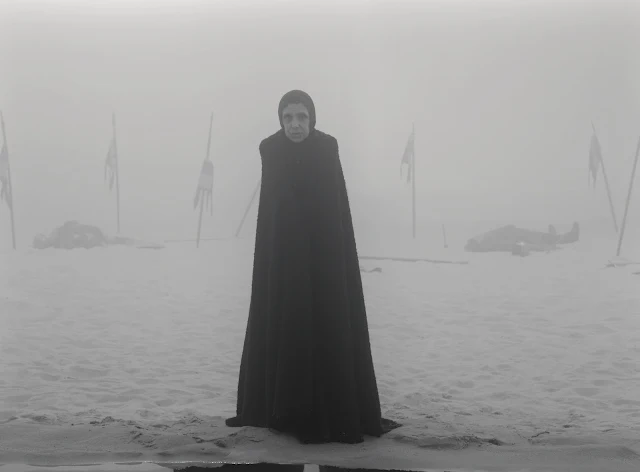Sound and fury
Joel Coen's latest is fascinating for what it's not--it's not a collaboration with his brother Ethan, not an original script or remake (or riff off a Greek classic a la O Brother Where Art Thou?), not in color but the rare straight adaptation, in stark black-and-white.
You'd think with subject matter this dark--Shakespeare's grimmest, most compact work-- the filmmaker would start with grays and shadows but no, he starts with white: disorienting, discombobulating white (thanks in part to Bruno Delbonnel's monochrome cinematography). What's sky, what's horizon? What's that wheeling in the air-- a kite, hawk, vulture? Is that someone lying on the ground? First few seconds of the film and already Coen plunges us into the visual equivalent of Macbeth's moral quagmire, where one doesn't know what's right or wrong, real or not, up or down. You're also reminded of Melville's disturbing treatise-- arguably the most unsettling he's ever written-- on 'The Whiteness of the Whale:' "all deified Nature absolutely paints like the harlot, whose allurements cover nothing but the charnel-house within;" where it's easy to assign danger to anything dark or black, the threat of white is more difficult to specify or define, and hence more terrifying.
Coen's film riffs off previous versions-- partly the brothers' trademark style, this calling back to earlier works, even their own, partly in a way unavoidable; some adaptations have moments so indelible it's difficult to imagine the scene done differently. Thus: the mists and shadowed tents of Throne of Blood (Akira Kurosawa may have been the first to literally illustrate the idea of lost in fog = lost moral compass); the sparely furnished castle of Orson Welles' version; the way the dagger sinks into the throat in Roman Polanski's (his way of empathizing, I imagine, with his wife Sharon Tate's fate in the hands of the Manson family).
Interestingly Coen includes the Polanski/Kenneth Tynan expansion of Ross's role, as Third Murderer, as the shadowy intelligence behind the scenes, even pushes the expansion further to involve Fleance.
Coen's film is brilliant in bits-- the shrouded opening; the sequences involving 'three' witches-- all played by Kathryn Hunter, whose alarmingly choreographed contortions are more disturbing than anything in Malignant (because they're so casually serenely performed); the witches' second appearance, as birds of prey roosting in the castle rafters. He even manages his own clever riff on the woods coming to Dunsinane-- if he can't match Kurosawa's vision of dancing trees literally filling the big screen he can at least shoot a swarm of leaves invading a castle window.
The fight choreography is excellent, from Banquo swinging a lighted torch (in a scene that recalls in part Charles Laughton's Night of the Hunter, in part Kaneto Shindo's Onibaba) to an aged emptyhanded Macbeth intimidating the Young fully armed Siward. The bar however has already been set high, by Polanski demanding the bruising best from veteran fight choreographer William Hobbs; for the record I prefer Polanski's (Hobbs described the rehearsals in hard rain as like "training for the decathlon")-- you get a sense from his choreography in everything from this to the final duel in Dangerous Liaisons that film fights have a rhythm to maintain a story to tell, that half the time what decides the winner is one's sense of invincibility, or lack thereof.
Coen stages the climactic faceoff between MacDuff and Macbeth-- usually the occasion for showing off your best moves-- in a narrow walkway atop the castle walls and while it's an innovative setting (you flinch to see them swing three foot swords in a space maybe three fourths that wide) it severely limits the positions the camera can take, forcing the director to cut more than he should-- we don't see the choreography as clearly as in other fight sequences.
I've heard Stefan Dechant's production design particularly the castle described as 'MC Escher;' I'd go further and say the castle looks like Escher assembled as illustration board cutouts, ready at any second to fold up and be snatched away (a neater trick than what Kurosawa managed with his witch shack). I'm a little less enthusiastic here: I remember Welles' production as being all cragged and iron-spiked (he had a budget from Republic Pictures of $700,000, a little over their poverty-row average of $200,000, with Welles contracted to make up any difference), Kurosawa's as being full of mist and forest, and Polanski's as mud and stone. As someone (I think Donald Richie--or was it Pauline Kael?) once put it, Kurosawa is the most Shakespearean of directors, and he revels in the sensuality offered by film adaptations; Coen seems to want to lean in the other direction.
There have been complaints that casting Denzel Washington as Macbeth and Frances McDormand as his lady robbed the characters of their sexuality, to which I reply: phooey. Washington strides across the screen as charismatically as ever (to be fair he does it towards the latter half, as dictated by the play); McDormand early on betrays a distinctly sexual predatory hunger, later a poignant sense of regret. Both being in their 60s recasts the characters in a different light: having grown old under king Duncan's service they're tired, likely feel they haven't been rewarded as they deserve (Washington's expression when Duncan's son Malcolm is promoted over him speaks pages), realize that only one or two of the best years of their lives remain, if any. This is a Macbeth and Lady with dwindled options, who on seeing sudden opportunity can't resist making a power grab-- they need to feel alive again, to hear all that sound and fury again, to feel they're getting somewhere again, if only for a brief moment.


No comments:
Post a Comment